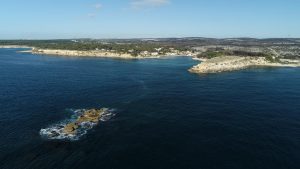-
The United States of America joined the HAC today during the Our Ocean Conference in Palau
-
Cyprus, Egypt, El Salvador, Honduras, Sierra Leone, Zambia, Somalia, St. Vincent and the Grenadines, Guinea, Bangladesh and Sri Lanka joined the HAC for Nature and People since the One Ocean Summit in Brest, France
The High Ambition Coalition for Nature and People (HAC N&P) is an intergovernmental group of over 90 countries co-chaired by Costa Rica and France and by the United Kingdom as Ocean co-chair, championing a global deal for nature and people with the central goal of protecting and conserving at least 30 percent of world’s land and ocean by 2030. The 30×30 target is a global target, which aims to halt the accelerating loss of species, and protect vital ecosystems that are the source of our economic security.
The High Ambition Coalition for Nature and People welcomes today’s announcement from U.S. Assistant Secretary of State for Oceans and International Environmental and Scientific Affairs Monica Medina that the United States will join the HAC. The United States is considered a “megadiverse” country with the 2nd largest territorial waters and the 4th largest landmass in the world.
Costa Rica Minister of Environment Rolando Castro Córdoba said, “We are happy to see the United States join the HAC for Nature and People. To reach a global goal of protecting and conserving at least 30% of the world’s lands and oceans, countries across the world will need to work together for the planet we all love.”
UK Minister for the Pacific and Environment, Zac Goldsmith said, “I’m thrilled that our friends in the USA have joined the High Ambition Coalition, joining the movement to reach 30×30. With the CBD COP15 this year and numerous other major international events, we have a real chance to agree measures to put nature on a path to recovery. It is wonderful to see this coalition continue to grow and prosper.”
During recent events, including the One Ocean Summit in Brest, France, and the Convention on biological diversity (CBD) negotiations in Geneva, Switzerland, the following countries: Cyprus, Egypt, El Salvador, Honduras, Sierra Leone, Zambia, Somalia, St. Vincent and the Grenadines, Guinea, Bangladesh and Sri Lanka joined the HAC for Nature and People. The HAC N&P now includes 94 countries.
Minister Castro Córdoba added, “It is heartening to see the momentum building for this essential goal. We are grateful to all the new members of the HAC for their leadership in addressing the biodiversity crisis.”
The HAC for Nature and People will continue to create a strong political momentum ahead of the COP15 to ensure the adoption of a scientifically grounded target and calls for any other countries wishing to adopt an ambitious post-2020 global biodiversity framework to join the coalition.
Explanation of Position of the United States of America Regarding the High Ambition Coalition for Nature and People
The United States takes this opportunity to express our support for the High Ambition Coalition for Nature and People.
The United States recognizes that conserving or protecting at least 30% of global lands and waters by 2030, pursued alongside restoration and sustainable management, represent critical and science-based efforts to address the dual crises of climate change and biodiversity loss.
The United States acknowledges that a wide range of conservation approaches – including conservation, protection, restoration, and other effective conservation measures – will need to be mobilized to successfully reach this global target, in line with national circumstances and approaches. The United States supports the voluntary stewardship efforts, of fishers, ranchers, farmers, and forest land managers to promote the sustainable management of natural resources, including by private landowners. Efforts to reach a global 30 percent target must include processes that respect and protect the rights of Indigenous peoples, and include them, together with local communities and underserved and vulnerable populations as key partners.
American Conservation Efforts
President Biden’s Executive Order 14008, Tackling the Climate Crisis at Home and Abroad, laid out how the United States intends to contribute domestically to the global effort, by committing to conserve at least 30 percent of America’s lands and waters by 2030. This commitment, the America the Beautiful initiative, will help strengthen the economy, address the interconnected climate and biodiversity crises, and advance environmental justice.
The America the Beautiful initiative has spurred a decade-long challenge to pursue a locally led and voluntary, nationwide effort to conserve and restore the health, productivity, and connectedness of the lands, waters, and wildlife upon which Americans depend. America’s lands have an important role to play in combating the climate crisis and reducing greenhouse gas emissions, by sequestering carbon in soils, grasses, trees, and other vegetation and producing sustainable bioproducts and fuels. America’s marine and coastal habitats, such as wetlands, seagrasses, coral and oyster reefs, and mangrove and kelp forests, are essential to mitigating climate change and strengthening resilience by protecting vulnerable coastlines, sequestering carbon, and supporting biodiversity and fisheries. Across these lands and waters, America the Beautiful has adopted a collaborative and inclusive approach to conservation, for the benefit of all, by supporting the conservation and stewardship efforts of farmers, ranchers, forest landowners, and fishers.
The key principles that will guide American conservation efforts to implement America the Beautiful, include:
-
Pursue a collaborative and inclusive approach to conservation;
-
Conserve America’s lands and waters for the benefit of all people;
-
Support locally led and locally designed conservation efforts;
-
Honor Tribal sovereignty and support the priorities of Tribal Nations;
-
Pursue conservation and restoration approaches that create jobs and support healthy communities;
-
Honor private property rights and supporting the voluntary stewardship efforts of private landowners and fishers;
-
Use science as a guide; and
-
Build on existing tools and strategies with an emphasis on flexibility and adaptive approaches.
The United States wishes to underscore that the High Ambition Coalition is non-binding and does not create or affect rights or obligations under international law, nor does it create any new financial commitments.


